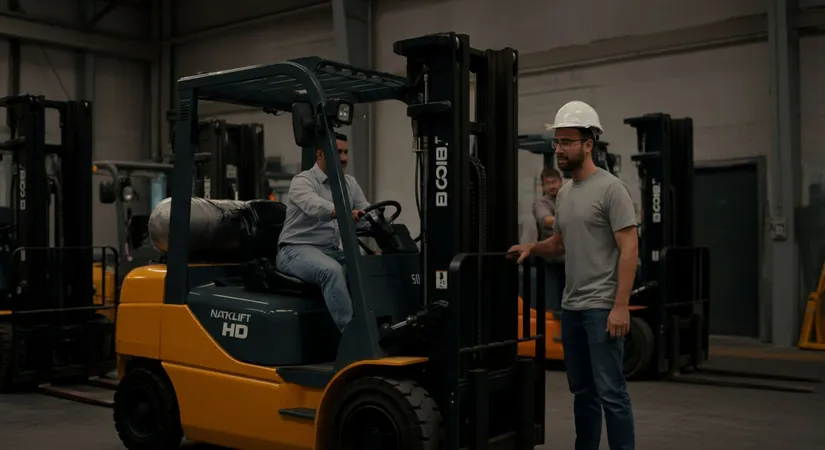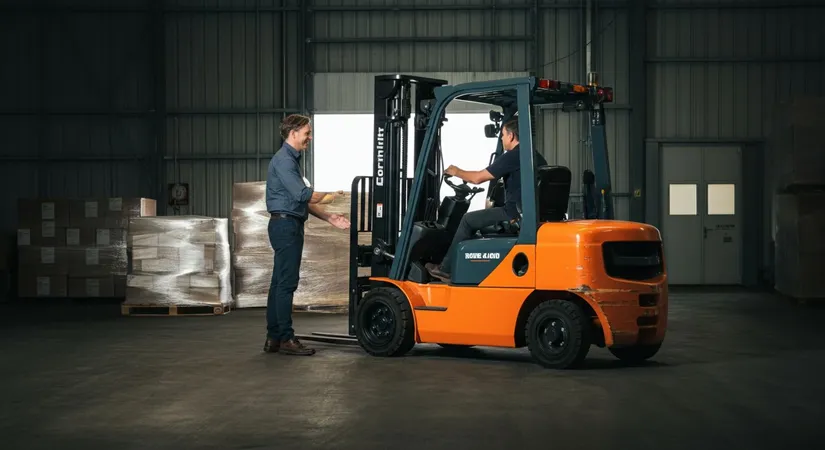Master Forklift Skills with Expert Training Courses
Enhance your skills with comprehensive forklift training courses. Get certified and ready for industry challenges.
Master Forklift Skills with Expert Training Courses
Becoming proficient in operating forklifts can significantly enhance your career in the logistics and warehousing sectors. Expert training courses not only prepare you for certification but also ensure that you are equipped with the essential skills for safety and efficiency. This guide explores everything from understanding what forklift training entails to finding the best programs available and taking advantage of online training options.
Understanding Forklift Training: What You Need to Know
Key Components of Forklift Training
Forklift training is essential for ensuring safety and efficiency in workplaces where forklifts are used. The training encompasses several critical components that equip operators with necessary skills and knowledge.
- Vehicle Maintenance: Understanding the basics of forklift maintenance helps prevent accidents and prolongs the vehicle's lifespan.
- Operation Skills: Trainees learn precise maneuvering techniques to handle loads safely and efficiently.
- Safety Regulations: Knowledge of safety protocols reduces workplace accidents and ensures compliance with legal standards.
Steps to Achieve Forklift Certification
Obtaining a forklift certification involves a structured process that ensures operators are fully prepared for their roles.
- Enroll in a Recognized Course: Choose a reputable forklift training course that covers all necessary modules.
- Complete Theoretical and Practical Training: Engage in both classroom learning and hands-on practice to gain comprehensive skills.
- Pass the Certification Exam: Successfully passing the exam demonstrates proficiency and understanding of forklift operations.
Forklift training not only enhances operational safety but also boosts productivity by ensuring that operators are well-versed in handling these powerful machines. With the right training, operators can significantly reduce the risk of accidents and improve workplace efficiency.

How to Get Forklift Certified: A Step-by-Step Guide
Choosing the Right Forklift Training Program
To embark on the journey of obtaining a forklift certification, selecting the right training program is crucial. Accredited programs ensure comprehensive learning and adherence to industry standards.
- Accreditation: Ensure the program is recognized by relevant authorities for quality assurance.
- Curriculum: Look for courses that cover both theoretical and practical aspects comprehensively.
- Instructor Expertise: Experienced instructors can provide valuable insights and real-world applications.
Steps to Complete Forklift Certification
Completing a forklift certification involves a series of structured steps designed to equip you with the necessary skills and knowledge.
- Register for a Course: Begin by enrolling in a course that fits your schedule and learning style.
- Engage in Training: Participate actively in both classroom sessions and hands-on practice.
- Pass the Final Exam: Successfully passing the exam is essential to earn your certification.
By following these steps, you can efficiently obtain your forklift certification, enhancing your employability in various industrial sectors. This certification not only opens doors to new job opportunities but also ensures you are well-prepared to operate forklifts safely and effectively.

Exploring the Best Forklift Training Programs Available
Evaluating Forklift Training Providers
Choosing the right forklift training program involves evaluating several key factors to ensure it meets your specific needs. The reputation of the training provider is paramount; look for those with positive reviews and industry recognition. For instance, a provider known for its comprehensive curriculum and experienced instructors can significantly enhance your learning experience.
- Provider Reputation: Opt for providers with a strong track record and positive feedback from past participants.
- Course Content: Ensure the curriculum covers essential topics like safety protocols and operational techniques.
- Training Format: Decide between in-person or online training based on your learning preference and schedule.
Investing in a quality forklift training program can open doors to various roles across multiple industries, enhancing both safety and efficiency in the workplace.
Key Considerations for Selecting a Training Program
When selecting a forklift training program, consider the format that best suits your lifestyle and learning style. Online courses offer flexibility, allowing you to learn at your own pace, while in-person training provides hands-on experience, which is invaluable for practical skills.
- Identify Your Learning Style: Determine whether you prefer visual, auditory, or kinesthetic learning to choose the right format.
- Research Course Offerings: Look for programs that offer a balance of theoretical knowledge and practical application.
- Check for Certification: Ensure the program provides a recognized certification upon completion to enhance your employability.
By carefully evaluating these aspects, you can select a forklift training program that not only meets your educational needs but also aligns with your career goals, ensuring you are well-prepared for the demands of the industry.
The Benefits of Online Forklift Training for Modern Operators
Advantages of Online Forklift Training
Online forklift training courses offer numerous advantages for modern operators, making them an attractive option for those seeking flexibility and comprehensive learning. These courses are designed to cater to the needs of busy individuals, allowing them to balance work and study effectively.
- Flexibility: Online courses allow learners to study at their own pace, accommodating different schedules and learning speeds.
- Accessibility: With internet access, training can be completed from any location, eliminating the need for travel.
- Interactive Learning: Many programs include interactive modules and live sessions, enhancing engagement and understanding.
These features make online forklift training a viable alternative to traditional methods, especially for those who prefer a self-paced learning environment.
Steps to Enroll in Online Forklift Training
Enrolling in an online forklift training course involves a straightforward process, ensuring that learners can start their training with ease.
- Research Available Programs: Begin by exploring various online courses to find one that suits your needs and preferences.
- Register for the Course: Once you have selected a program, complete the registration process to gain access to the course materials.
- Engage with the Content: Actively participate in the interactive modules and live sessions to maximize your learning experience.
By following these steps, individuals can efficiently enroll in online forklift training, gaining the skills and knowledge necessary to operate forklifts safely and effectively in various industrial settings.
Seasonal Forklift Training: Preparing for Winter and Summer Operations
Adapting Forklift Skills for Seasonal Challenges
Seasonal forklift training is crucial for adapting to the unique challenges presented by different weather conditions. During winter, operators must be equipped with skills to handle icy and slippery surfaces, which can significantly impact maneuverability and safety. For example, understanding how to adjust speed and braking techniques on ice can prevent accidents.
- Winter Safety: Training includes techniques for navigating icy surfaces and managing reduced visibility.
- Summer Efficiency: Courses focus on heat management and dust control to maintain operator comfort and machine performance.
- Environmental Adaptation: Operators learn to adjust their techniques based on seasonal weather patterns.
Steps to Implement Seasonal Forklift Training
Implementing seasonal forklift training involves a structured approach to ensure operators are well-prepared for environmental changes.
- Identify Seasonal Needs: Assess the specific challenges each season presents to tailor the training accordingly.
- Develop Specialized Modules: Create training modules that address winter and summer operational requirements.
- Conduct Regular Assessments: Evaluate operator performance and adapt training to address any emerging issues.
By investing in seasonal forklift training, companies can enhance safety and efficiency, ensuring operators are equipped to handle diverse environmental conditions effectively. This proactive approach not only reduces the risk of accidents but also optimizes operational productivity throughout the year.
Local and Cultural Considerations in Forklift Training
Understanding Regional Differences in Forklift Training
Employing local training providers offers distinct advantages, particularly in understanding regional regulations and cultural contexts. For instance, forklift training in New York may differ significantly from Los Angeles due to varying regulatory environments and industrial landscapes. This local expertise ensures that training is not only compliant but also relevant to the specific operational needs of the area.
- Regulatory Compliance: Local providers are well-versed in regional laws, ensuring training meets all legal requirements.
- Cultural Relevance: Training programs can be tailored to reflect local cultural nuances, enhancing engagement and effectiveness.
- Community Connection: Utilizing local trainers fosters community relationships, which can lead to more practical and applicable training experiences.
Steps to Integrate Local Considerations into Forklift Training
Integrating local and cultural considerations into forklift training involves a strategic approach to ensure that programs are both effective and relevant.
- Assess Regional Needs: Conduct a thorough analysis of local regulations and industry practices to tailor the training content.
- Engage Local Experts: Collaborate with local industry professionals to incorporate region-specific insights and practices.
- Customize Training Modules: Develop training materials that reflect local cultural and operational contexts, enhancing learning outcomes.
By focusing on local and cultural considerations, forklift training programs can significantly improve their relevance and effectiveness, ensuring operators are well-prepared to meet the unique demands of their specific environments. This approach not only enhances safety and compliance but also fosters a deeper connection with the local workforce, ultimately leading to more successful training outcomes.
Master Forklift Skills with Comprehensive Training Programs
Online Forklift Training: Flexible Learning for Modern Operators
Frequently Asked Questions
What is forklift training and why is it important?
How can I get forklift certified?
What are the benefits of online forklift training?
How do seasonal changes affect forklift training?
Why are local and cultural considerations important in forklift training?
Discover the path to your healthiest and most beautiful self with estethica's award-winning services. Call now for a free consultation and let our expert team guide you on your journey to wellness and aesthetics.
📞 Call Us for Your Free Consultation